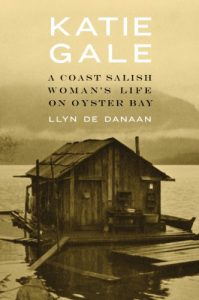A gravestone, a mention in local archives, stories still handed down around Oyster Bay: the outline of a woman begins to emerge and with her the world she inhabited, so rich in tradition, so shaken by violent change. Katie Kettle Gale was born into a Salish community in Puget Sound in the 1850s, just as settlers were migrating into what would become Washington State. With her people forced out of their accustomed hunting and fishing grounds into ill-provisioned island camps and reservations, Katie Gale sought her fortune in Oyster Bay. In that early outpost of multiculturalism—where Native Americans and immigrants from the eastern United States, Europe, and Asia vied for economic, social, political, and legal power—a woman like Gale could make her way.
As LLyn De Danaan mines the historical record, we begin to see Gale, a strong-willed Native woman who cofounded a successful oyster business, then wrested it away from her Euro-American husband, a man with whom she raised children and who ultimately made her life unbearable. Steeped in sadness—with a lost home and a broken marriage, children dying in their teens, and tuberculosis claiming her at forty-three—Katie Gale’s story is also one of remarkable pluck, a tale of hard work and ingenuity, gritty initiative and bad luck that is, ultimately, essentially American.






